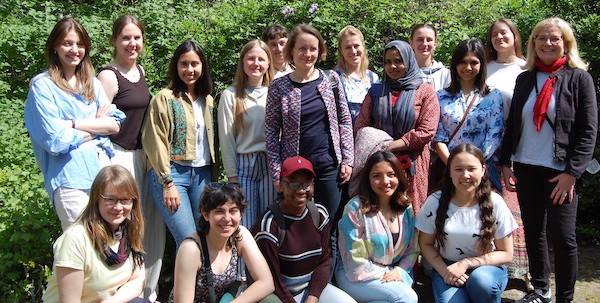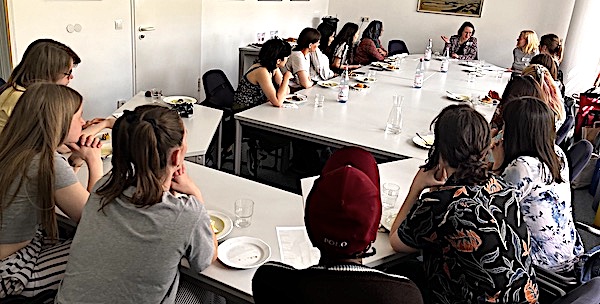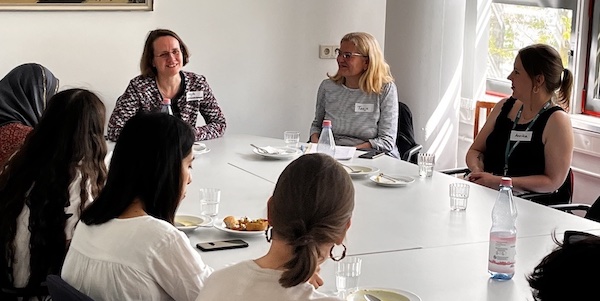On the occasion of the 30th Kovalevskaya Lunch on 12 May, the “International Women in Math Day”, Tanja Fagel, MATH+ Gender & Diversity Manager, gave us interesting insights into the popular tradition of the lunch in an interview. She describes the importance of the event for young female mathematicians, who experience female professors very closely as role models and can ask burning questions in a direct exchange.


The “Kovalevskaya Lunch” is coming up to its 30th anniversary this year, Congratulations! How will you celebrate?
It is a great reason to celebrate! Especially because the Lunch is being held on “International Women in Mathematics Day”, which is the 12 May. So it will be a double celebration.
Why was this event named after the Russian mathematician Sophia Kovalevskaya (1850-1891)?
Sophia Kovalevskaya is a fantastic role model, because she was the first woman professor for mathematics worldwide, and she stood up for the right of all women to an education. The idea of the Kovalevskaya Lunch is to introduce women mathematicians to one another, giving young scientists a chance to get to know other, more experienced women in their field who can serve as role models.
What was the reason and the goal for introducing this format and the event?
It is still the case that fewer women complete their doctorate in mathematics than men. Therefore, there are relatively few women professors of mathematics as role models for young women. On average, only about 12 percent of math professors are women. That means it can easily happen that a woman student or doctoral candidate completes an entire study course without having come across a single woman professor. The Kovalevskaya Lunch aims to help redress this balance in a small way. The young women get the opportunity to meet a woman mathematician, get to know her, and ask her questions. There might be questions that they would not ask a man in the same position. The lunch itself is quite informal, with a few snacks and a pleasant atmosphere. At the beginning of the event, every participant takes a short moment to introduce herself. This makes it easier to ask questions later. Everyone is also provided with a name tag so it is easier to remember one another’s names. Often the participants are still busy talking long after the Lunch is over, when they get a chance to network and to maybe meet up again at the next Lunch.
Do you have a personal highlight from all of the Kovalevskaya Lunches? Which women mathematicians have fascinated you the most?
I have enjoyed all of the Kovalevskaya Lunches immensely. The guests and their career paths have been very diverse, and that is the beauty of it. I especially remember Ingrid Daubchies (at the Lunch on 11 November 2011), who strongly urged the young women present to be very particular in their choice of life partner. It is enormously important that it is someone who is willing and able to support them. In a very different way, Sujatha Ramdorai (at the Lunch on 2 June 2017) was also special because of her tremendous energy. She was so unbelievably inspiring, captivating the young women – and me too. Another very different experience was with Maryna Viazovska (Lunch on 13 May 2022), who explained beautifully how mathematics gives her strength, especially since Ukraine had entered into a war only a few months previously, which was a huge challenge for Marya as a Ukrainian woman. Nevertheless, she exuded this calmness and she is in possession of a very engaging dry sense of humor – I will also certainly remember that Lunch for a very long time.For me, the great charm of this event lies in hearing from these different characters, how they have handled challenges and doubts, what they find frustrating, and what or who in one way or another has given them strength or enriched them. That is very individual. I always find it interesting to hear the next guest, and I would like to advise our women students, doctoral students and postdocs to take part in several Kovalevskaya Lunches and encourage those who have not yet been to sign up for it.

How do young BMS/MATH+ women mathematicians respond to the offer?
It varies. I experience young women who come to almost every Lunch during their time at the BMS and are real fans of it. And then there are some that do not take advantage of the offer. The offer is voluntary and that is a good thing. A few years ago at a BMS celebration, a doctoral candidate approached me who was just about to finish her PhD. She told me how grateful she was to me for what I organized at the BMS. At the beginning of her master’s degree she had not understood why there were events just for women. During the course of her PhD she realized how important that offer had been for her and how much strength it had given her. Then she thanked me and hugged me with tears in her eyes. That was an overwhelming moment for me.
What would you wish for in terms of your work in “Gender & Diversity“?
There is a lot and this is just a small selection. Above all, I wish for more men to speak out for gender equality, equal opportunities, and fairness. That the insight prevails that it is the structures that hinder women and also other marginalized groups and that the women and marginalized groups themselves are not the problem. That excellence and gender equality are not in opposition to one another, but should only be addressed in combination. That more fathers take parental leave for just as long as mothers, and that this becomes even more natural. That young parents get so much support from their working environment that they can manage their family and their work without burning out. That the professorate gets more colorful in every way. And to close the circle: That women mathematicians are not only invited to the Kovalevskaya Colloquia, but also more often to the regular MATH+ Fridays. In some semesters that has already worked really well.
Thank you very much for the interview and the interesting insights and reviews!
Beate Rogler





















